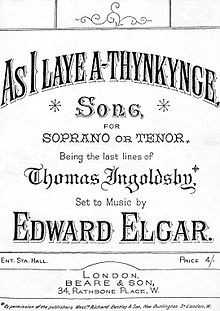- As I laye a-thynkynge
-
"As I laye a-thynkynge" is the last poem written by "Thomas Ingoldsby" (Richard Barham). It was set to music by the English composer Edward Elgar.
The song was published in 1888 by Beare & Son,[1] though may have been written in the previous year. It is a song for soprano or tenor.
Elgar omitted the two verses enclosed in square brackets [ ] - the fifth and sixth verses of the poem.
Contents
Lyrics
AS I LAYE A-THYNKYNGE
- As I laye a-thynkynge, a-thynkynge, a-thynkynge,
- Merrie sang the Birde as she sat upon the spraye!
- There came a noble Knyghte,
- With his hauberke shynynge brighte,
- And his gallant heart was lyghte,
-
- Free and gaye;
-
- As I laye a-thynkynge, he rode upon his waye.
- As I laye a-thynkynge, a-thynkynge, a-thynkynge,
- Sadly sang the Birde as she sat upon the tree!
- There seemed a crimson plain,
- Where a gallant Knyghte lay slayne,
- And a steed with broken rein
-
- Ran free,
-
- As I laye a-thynkynge, most pitiful to see!
- As I laye a-thynkynge, a-thynkynge, a-thynkynge,
- Merrie sang the Birde as she sat upon the boughe;
- A lovely Mayde came by,
- And a gentil youth was nyghe,
- And he breathed many a syghe
-
- And a vowe;
-
- As I laye a-thynkynge, her heart was gladsome now.
- As I laye a-thynkynge, a-thynkynge, a-thynkynge,
- Sadly sang the Birde as she sat upon the thorne;
- No more a youth was there,
- But a Maiden rent her haire,
- And cried out in sad despaire,
-
- 'That I was borne!'
-
- As I laye a-thynkynge, she perished forlorne.
- [ As I laye a-thynkynge, a-thynkynge, a-thynkynge,
- Sweetly sang the Birde as she sat upon the briar;
- There came a lovely Childe,
- And his face was meek and mild,
- Yet joyously he smiled
-
- On his sire;
-
- As I laye a-thynkynge, a Cherub mote admire.
- But I laye a-thynkynge, a-thynkynge, a-thynkynge,
- And sadly sang the Birde as it perch'd upon a bier;
- That joyous smile was gone,
- And that face was white and wan,
- As the downe upon the Swan
-
- Doth appear
-
- As I laye a-thynkynge - oh! bitter flow'd the tear! ]
- As I laye a-thynkynge the golden sun was sinking,
- O merrie sang that Birde as it glittered on her breast
- With a thousand gorgeous dyes,
- While soaring to the skies,
- 'Mid the stars she seem'd to rise,
-
- As to her nest;
-
- As I laye a-thynkynge, her meaning was exprest:-
- 'Follow, follow me away,
- It boots not to delay,'-
- 'Twas so she seem'd to saye,
-
- 'HERE IS REST!'
-
-
-
-
-
-
-
- T. I.
-
-
-
-
-
-
-
- 'HERE IS REST!'
-
Recordings
- Songs and Piano Music by Edward Elgar Premiere recording of "As I laye a-thynkynge" performed by Amanda Pitt (soprano), with David Owen Norris (piano).
References
- Banfield, Stephen, Sensibility and English Song: Critical studies of the early 20th century (Cambridge University Press, 1985) ISBN 052137944X
- Kennedy, Michael, Portrait of Elgar (Oxford University Press, 1968) ISBN 0193154145
Notes
- ^ John Beare was a London-based music publisher and brother-in-law of Elgar's friend Dr. Charles Buck of Settle in Yorkshire
Categories: Songs by Edward Elgar | 1888 songs
Wikimedia Foundation. 2010.

